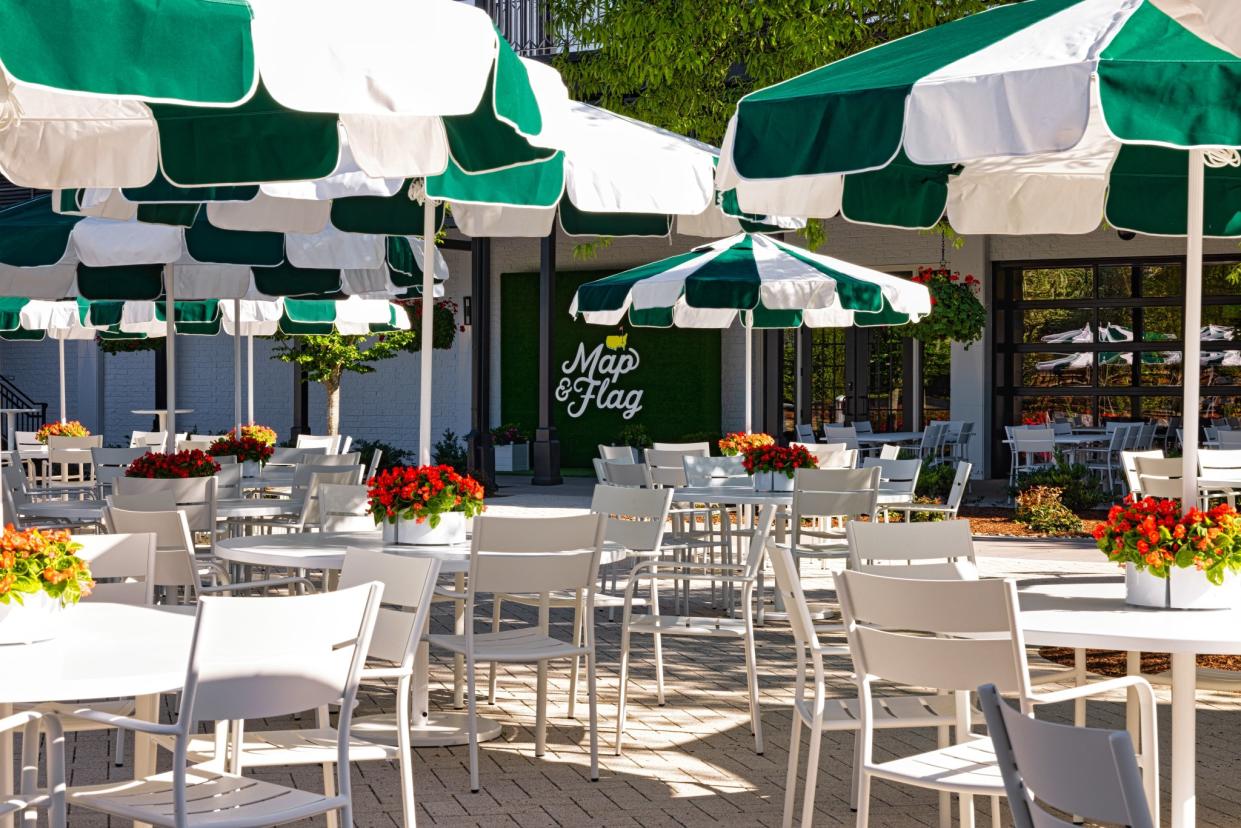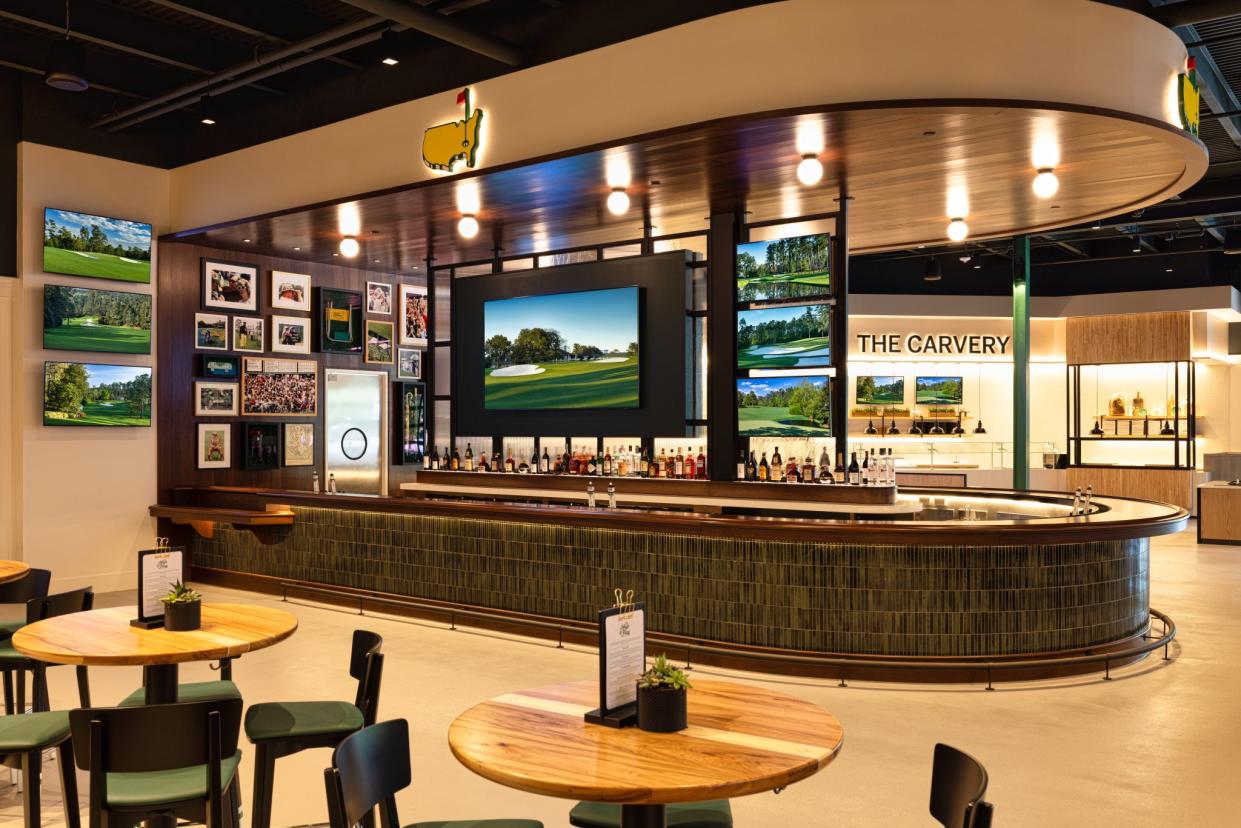
AUGUSTA, Ga. — The Augusta National Golf Club prefers — mandates even — a throwback state of calm. No cellphones or electronic signage. No announcements or radios. Just wind whispering through the tall Georgia pines, the way Bobby Jones and Jim Nantz dreamt it to be.
Cue the piano notes and the footage of a babbling Rae’s Creek.
Yet just outside the gates, to, no doubt, the chagrin of the members here, is the blaring rock concert of American capitalism and consumerism. Washington Road, which leads from I-20 to iconic Magnolia Lane, is lined with strip malls and fast food joints, turn lanes and chaos.
There’s the Waffle House, not far from the Tidal Wave car wash. There’s T-Bonz, where they pair Texas Cheese Fries with the New York strip. There’s the Hooters where John Daly sets up shop and sells T-shirts. The dichotomy has always been part of the charm.
Not so much for Augusta National, apparently. Through the years, especially of late, the club has tried to soften the divide by eliminating the need for public interaction with the rest of the world. They’ve bought nearly entire neighborhoods surrounding the club and turned them into grass-covered parking. They’ve rerouted city streets. They’ve acquired shopping plazas and bulldozed them. They built underground tunnels to privatize movement. Former chairman Billy Paine once described a 20-year plan for the club.
There are rumors of expansion into additional housing adjacent to the course, direct, special access to and from the interstate and spreading the club’s footprint out along Washington Road to minimize, if not eliminate, ticket brokers, entrepreneurs and the general carnival atmosphere they can’t control.
Augusta National does plenty of philanthropic work around the region, but in terms of its tournament, it would prefer to exist as a self-contained unit — sort of a Disney World, with fewer independent businesses and citizens of Augusta getting in on the action.
The latest is a push to overtake the independent hospitality operations that have sprung up outside the course to offer companies and individuals places to gather before, during or mostly after a round of the tournament.
Up and down Washington, as well as in homes in the surrounding neighborhoods, people pay for a spot to relax, eat, drink and perhaps hit balls on a golf simulator or hear a pro golfer in a question-and-answer session.
This year, however, Augusta National opened its own offering, the Map and Flag Club, which sits on the corner of Berkmans and Washington, built on land that used to house the Electrolux headquarters.
For reportedly $17,000, you can buy a weekly badge and access to the Club, which includes valet parking, a merchandise shop and places to gather ranging from an outdoor patio and something that resembles a sports bar. The club hypes “inclusive food and beverage with chef-inspired food concepts” and dubs it a “premium patron experience … with a level of service only found at the Masters.”


The Map and Flag is a seven-minute walk from the north gates and the Masters’ first foray into an outside-the-fence business. Eleven years ago it opened Berckmans Place, which is a luxury entertainment club on the grounds behind the fifth hole.
Last year, chairman Fred Ridley hailed Berckmans as “the greatest hospitality venue in all of sports,” but it also changed the dynamics of attending the Masters.
One of the appeals of this tournament was that every patron was treated equally. There is no inside-the-ropes access. There are no VIP boxes, no party decks or special seating. If you were following, say, Dustin Johnson, you could walk right alongside his father in law … Wayne Gretzky. It was all the same.
And if you were hungry, well, everyone ate a cheap sandwich wrapped in green cellophane. The pimento cheese became its own tradition like no other.
Berckmans offered something extra to the richer and more connected. With 90,000 square feet of air-conditioned opulence, there are oysters on the half shell, multiple full-service bars and three putting greens that are replicas of the seventh, 14th and 16th holes. The shop sells items that aren’t available in the main merchandise hall.
It capitalizes on the “next door” phenomenon of people wanting something more special than what’s already special. It has no doubt served its clients well and raked in huge sums for the club, but there is a cost when an event that long prided itself on inclusivity caters to exclusivity.
The Map and Flag isn’t quite that. But it is a business taking over what other businesses are already offering. Put another way, it’s one more expansion of Augusta National that muscles out the “little guy,” if you will.
With each step, this tournament is less about coming to Augusta, Georgia, and a little bit more about just coming to Augusta National’s version of Augusta, Georgia.
Perhaps clean and quiet and nice is preferable.
But there remains something special, too, about slugging back beers with John Daly in a tent next to a chicken wing joint. And it won’t cost you $17K.

